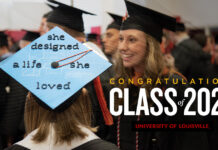
When you say a deal is not financially viable, what specifically are you referring to?
President Bendapudi: It did not turn out that we had attractive options. The offers we got were not viable.
We are really referring to a couple of things. One is finding a partner that would invest the dollars to make sure that we could run all these hospitals in a sustainable manner. As you know, with many of these, there would be fresh infusions of cash required for deferred maintenance, for IT, for those types of things. And (second), during negotiations, you realize whether it’s possible to come to an agreement or not, and in this case, it was not.
We know that our most important obligation is to the University of Louisville. We need to make sure that we are financially viable and sustainable, and that we thrive.
How much money are you talking about?
President Bendapudi: It’s hard to say. I don’t want to pinpoint a particular number but we were looking for a partner that would keep this viable. During the process we had three potential suitors…trying to see if this would work. In the timeframe, however, they all needed significantly longer. I’m not avoiding the question, but candidly, how much is required is dependent upon the structure of the deal. How much equity would we give out? What would happen? That’s why I’m not able to tell you. If someone came in and said, ‘we just want 10 percent,’ it would look very different from if we were going to be full partners.
What happens now?
President Bendapudi: The good news is that both parties are committed to an orderly transition. What I am happy to tell you is that all of our agreements have been extended with no real end date. Our Academic Affiliation Agreement and Master Services Agreement are still in place. If these are to end for any reason, we have to be given a 90-day notice.
We are very reassured that … for the residents’ training … we have an agreement that if Jewish Hospital were sold, those residency slots transfer to the university or to the facility of our choosing.
Down the road, if KentuckyOne finds a partner who is not interested in extending your agreement, what happens then?
President Bendapudi: There’s a minimum of a 90-day notice (from KentuckyOne Health) we would have to be given about a potential partner. And even then, I’m confident that given the long history of this community and the importance (of these facilities) to it, it would be a very orderly process. We have been doing contingency planning so that none of our programs is at risk. We would have to find alternative locations for the services we provide. Or maybe a potential buyer would say they want to work with us; that’s possible.
How do you guarantee these programs’ protection?
President Bendapudi: Our agreements are all in place, so for our doctors, other health care providers that are working in these facilities – nothing is imminent. There’s no problem. If (KentuckyOne Health) says they are going to shut down a facility, then we would move our programs. We would have new AAAs and MSAs with the places where we would practice and for the services we would provide. In our contingency planning we have been looking at what we can move to our facilities and we are looking at the other health systems – Norton (Healthcare) and Baptist (Health System). I have reached out to both CEOs. A lot of what we already have done has been is putting all the data into a data room…and verifying all the numbers that both sides were getting. … So the conversations (with Norton and Baptist) are not new. In contingency planning, that’s what you do: If this happens, what will we do? If this doesn’t happen, what will we do? So none of this is starting from zero because clearly, we’ve all been thinking about this as have they.
What was your level of confidence going into this and how surprising or disappointing is it that you could not find a partner?
President Bendapudi: Going in, we knew that we had to look. It really was a moral obligation that we, as a university, had to try to keep (Jewish) open. Internally we knew that it was a toss-up whether we could do it but it’s one of those things where you say, “be brave and try.” So I give credit to our Board and to our people that we said, “we must try.” Are we disappointed? Yes. Because it would have been great to make this work. But I have to say that discretion is the better part of valor. Looking at the numbers that we saw, we could not see how we could do it in a way that would not jeopardize the university.
Again, we owed it to the university, to the community to try (and make this deal). We had an obligation to try. We were enthusiastic about the potential. It was really important to give it everything we had. And we did.
The press conference in its entirety is available here:






























